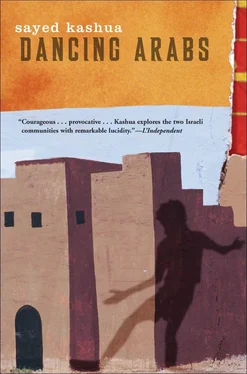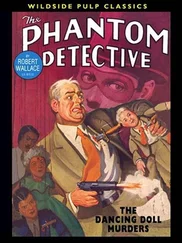My parents built three shells, even though there are four of us, because the fourth one is supposed to get their house. But they know that at least one of us won’t come back. Now they’re worried that the youngest, the one who’s six years younger than me, may wind up staying in Tel Aviv. He’s studying there, but he also works there all week long, taking care of chronic patients at the hospital. He’s broken off with us in Tira. He’s let his hair grow long, and he wears earrings. He dresses differently and listens to different music. Sometimes we talk on the phone. The last time we did that, we made a date to meet in Tira. He finally said he’d come to see the baby, but he didn’t. He phoned and asked us to give her a big kiss for him, and to put the receiver to her ear so she’d learn to recognize his voice.
This brother and I get along very well. Sometimes I think he must hate me for the things I did to him when I was little. I hope I was little enough. When I get very anxious about it, I call him up and ask him to forgive me and tell him I want to know if he hates me. He always says he loves me more than anything in the world.
I’m six years older, but if he returns to the village before me, he’ll get my shell and I’ll get my parents’ house. Since the house is old, my parents have added a larger piece of land to go with it, to be fair and prevent any problems later on. My father always says, “God help you if you fight among yourselves. That would be the worst thing that could happen.” People have been fighting over land for fifty years now: brothers against brothers, cousins against cousins. Some of them lost their lives in the process, and the survivors are still taking revenge. The wealthiest people today are the ones who managed to take over two meters of the souk on Saturdays.
Almost everyone carries a weapon nowadays. My father went to get the muffler fixed once, and they offered to sell him a shotgun for a thousand shekels. He almost bought it, for self-protection.
The neighbors’ young son, Ayub, was arrested. I remember him as a shy seven-year-old. My mother says he’s an arms dealer. They sent the whole country out to Tira last week. They blocked the roads, they broke into the house, and they pulled up the floor tiles, one by one. My parents knew all along that Ayub was an arms dealer. At first they thought the reason he hadn’t been arrested was that he was a civil servant. He had a Uzi, and almost every night he’d shoot a round. “ Brrrrr. ” My mother imitates it. “Automatic.” She didn’t think he was dumb enough to hide the weapons at home, but that’s just what he did. They found a lot. She stood by the fence and watched. Fifty pistols maybe. The police and the soldiers were there the whole day. They combed every corner. They entered our plot too with dogs and metal detectors, but they didn’t find anything. The dogs sniffed every flower, because they were after drugs. My mother says the police even climbed up on the roofs of my brothers’ homes and searched in my shell too. “Aren’t you ever going to finish it?” she asks. “When are you coming back?”
My parents have enormous pink sofas in their living room. I sink into one of them and light a cigarette from the pack my father has left on the table. I move my head back and forth like a sprinkler, trying to disperse the smoke. Our house is ugly. There are electric wires sticking out of the living room wall, and a bell that never rings. Next to it is a clock made of gold-covered plastic, inspired by a lion’s mane. Hanging next to the clock is a deer’s head, also made of plastic. There used to be two sabers too, but they broke long ago. Three brown wooden plaques hang unattractively on the wall across from me, with the inscription Allah in black lettering. On the wall to the left, there’s a painting by Ismail Shammout with the inscription Uda (Return), and next to that is a picture of a mother and a baby with a flight of ravens hovering over them.
The ugliest tapestry in the living room was woven by my mother. It shows two Japanese women in kimonos sitting near a blue lake with white swans floating in it. She made the Gobelin when she was studying at the teachers seminar in Haifa. She always says she was the first woman to study out-side the village, and the fact is she’s now the oldest woman teacher in Tira.
When I was at the university, I invited Yossi for a meal at my parents’ house. Yossi was my first Jewish friend after boarding school. He marked a new period in my life and proved I didn’t have to be stuck with Arabs my whole life. After the meal, he joked about how our sink was in the living room, though the thought of watching the soccer match while shaving appealed to him. When we first met, Yossi said he found it hard to say the word Arab, because it sounded like a curse. Later, we became good friends.
Now my father is lying on the big sofa, resting the upper part of his body on two pillows. With one hand he’s half scratching and half picking his nose, and with the other he’s holding a cigarette. My mother is washing something in the kitchen. My older brother and his wife come in and sit down. She’s pregnant, in her fifth month, and they don’t know yet if it’s a boy or a girl. The brother who’s two years younger than me is talking to his fiancée on his mobile. It’s a special deal called Family Circle. They bought two mobile phones and they can call each other for free.
Time for the news. My father turns up the volume, moves his hand away from his nose, puts out his cigarette, and lights another. Mother puts a bowl of strawberries on the table and sits down on the carpet at Father’s feet. There’s no room on the sofa, because Father is taking up three places.
“There are no men in Hebron,” my father says. He always provides a running commentary on whatever we’re watching on television, analyzing it out loud, to make sure we don’t miss anything. Every now and then my mother mutters Azza, azza —Oh, no — and sometimes she says mujrimin, criminals. My father says if there were any real men in Hebron they’d get their act together and force the settlers out of there. “How many can they kill? Let them kill a hundred thousand. In the end, they’ll be out of there. Five lunatics are terrifying a whole city. What spineless nothings they are!”
It’s March 30, Land Day, and people turn out to join in a general protest against the expropriations and to commemorate the people who were killed in the 1976 riots. My wife and her parents went to visit their village, Misskeh, where Kfar Warburg is today. They rented a bus and went as a group. They do it every Land Day and every Independence Day. It’s like an annual outing. Men, women, and children dress up, take their food and their barbecues, their meat and their alcohol, and head for their village. You can still see what’s left of the mosque and the school building. The women gather vine leaves and look for hyssop in the fields, the men play backgammon in the ruins of the mosque, and the younger ones drink beer and smoke joints in what’s left of the school.
My father says he doesn’t understand why they bother going there. If they really loved their village, they wouldn’t have run away in the first place. Those cowards are to blame for everything that’s happened. Better to die defending your land. And why did they sell what they owned there? My father refers to the sale of expropriated lands to Jews as land liquidation. Anyone who sells has given up. “What kind of men are they?”
In the evening, I join my wife and daughter at her parents’ house. They’re back from their picnic. My older brother blocks me with his car and comes over to give me the keys. I enjoy driving his car. At least the radio works. True, it’s only a short drive, but still it’s one of those rare opportunities to listen to music in Tira. I hope it’s tuned to the military station, because I’m not very good with these dials. I turn it on and listen. My brother doesn’t know how to take care of a car. He can’t drive. I’ve been in the car with him a few times, and it always ended in a fight. I don’t have it easy with my older brother.
Читать дальше












